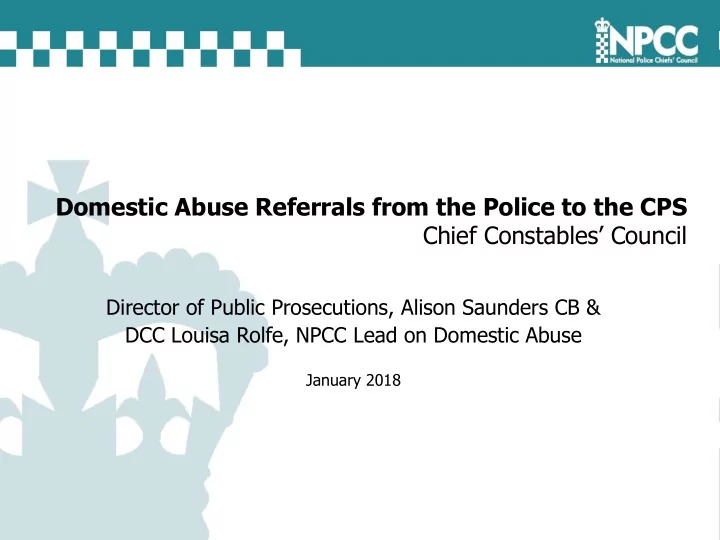

Domestic Abuse Referrals from the Police to the CPS Chief Constables’ Council Director of Public Prosecutions, Alison Saunders CB & DCC Louisa Rolfe, NPCC Lead on Domestic Abuse January 2018
1. Overview - DPP Over the last ten years, there have been huge improvements in the way in which domestic abuse is investigated and prosecuted. More recently, despite increases in recorded incidents and crimes of domestic abuse, there has been a fall in referral of cases to the CPS. There have also been falls in the referral of rape and hate crime cases which are being considered separately. Her Majesty’s Inspectorate of Constabulary and Fire & Rescue Services (HMICFRS) report on domestic abuse and discussions with police and CPS domestic abuse leads highlighted a number of areas which are relevant in ensuring appropriate referral of domestic abuse cases. A joint NPCC and CPS troubleshooting guide has been developed for frontline colleagues to help ensure appropriate referrals of domestic abuse. In addition, we recommend that the police and CPS domestic abuse leads work together to review cases, assess decision-making and take steps to address any identified issues.
2. What the data shows - DCC Rolfe Between 2007-08 and 2016 – 17, conviction volumes of cases flagged as domestic abuse have risen from 43,977 to 70,853 – a rise of 26,876 convictions and a 61% increase over this ten year period. (CPS data) The volume of domestic abuse referrals from the police fell from 117,882 in 2015 – 16 to 110,833 in 2016 – 17 – a fall of 7,049 referrals (6.0%) with variation across police forces. This led to falls in prosecutions and convictions. Against this, the ONS report published on 20 July 2017 found that police recorded crime increased by 10% to 464,886 offences between 2015-16 and 2016-17 over the same period.
3. Further consideration of the fall - DCC Rolfe Findings from HMICFRS within ‘A progress report to the police response to domestic abuse’, published in November 2017, identified a number of areas of improvement some of which may have a bearing on the appropriate referral of cases. Specifically, issues were identified across some forces in relation to risk assessment, the first response and the use of police powers to pursue positive outcomes. In addition, following discussions with police domestic abuse leads, we also identified a need to challenge a number of perceptions, including that prosecutors were rejecting cases contrary to charging requirements.
4. Solutions - DCC Rolfe To help ensure the appropriate referral of domestic abuse cases, a NPCC and CPS troubleshooting guide for police and prosecutors was published in December 2017. It is a practical and accessible document consolidating relevant advice from the College of Policing Authorised Professional Practice and CPS Legal Guidance. We have asked Chief Constables, Chief Crown Prosecutors as well as the police and CPS domestic abuse leads to circulate the guide to colleagues and encourage them to consider it. We have also recommended that police and CPS domestic abuse leads work together to assess decision-making in cases where there has been a police decision to take no further action, CPS decision to take no further action as well as consideration of alternative disposals by the police. This exercise was carried out in Mersey-Cheshire and led to an increase in the number of cases referred alongside an increase in the number of convictions and the conviction rate.
5. Next steps - DCC Rolfe An update on the progress made so far will be provided to the National Oversight Group on Domestic Abuse, chaired by the Home Secretary, in February 2018. As part of the work of the Group, the Home Office is analysing the fall in referrals in greater detail to identify any patterns or trends within specific forces. An update to relevant forces will be sent separately. In addition, the HMICFRS report recommends that by April 2018 every police force in England and Wales should update its domestic abuse action plan. The report goes on to recommend that these action plans consider what more can be done around referrals and suggests that forces need to monitor data and work closely with the CPS to understand whether improvement is required.
6. Closing remarks- DPP
Recommend
More recommend